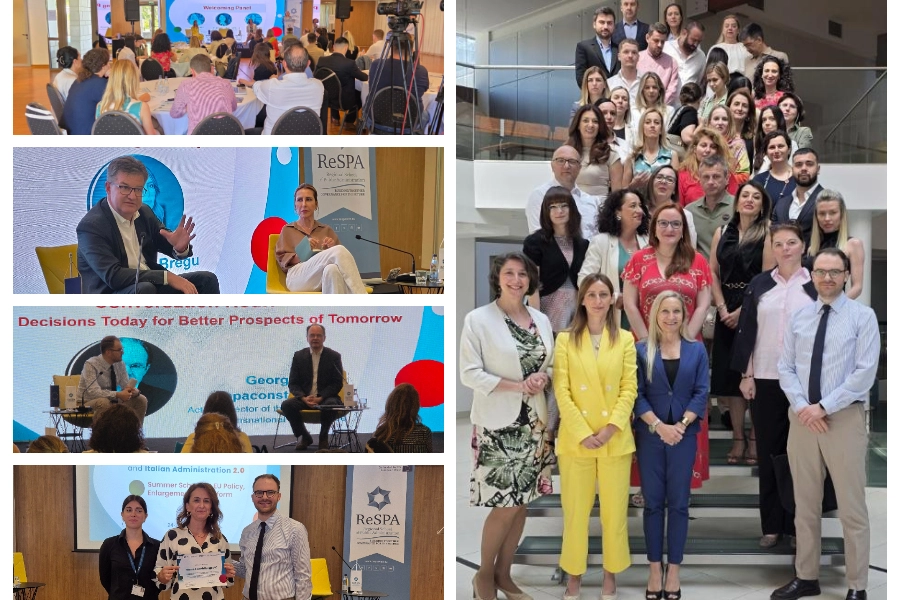
2025 Summer School on “EU Policy, Enlargement and Reform”: A Deep Dive Into Europe’s Shared Future
Budva, 24–27 June 2025
The 2025 edition of the Summer School on EU Policy, Enlargement and Reform brought together over 35 public servants dealing with EU integration matters from across the Western Balkans for four days of in-depth exchange, critical reflection, and forward-looking dialogue. Organised jointly by the European University Institute (EUI) and the Regional School of Public Administration (ReSPA), with the support of the Italian Ministry of Foreign Affairs and International Cooperation, this flagship programme aimed to strengthen strategic understanding and regional cooperation in the context of the EU enlargement agenda.
The Summer School officially opened on 24 June with welcome remarks from Andreina Marsella, Ambassador of Italy to Montenegro, Ambassador Ana Vukadinović from Montenegro’s Ministry of Foreign Affairs, and Maja Handjiska Trendafilova, Director of ReSPA. Ms. Marsella reaffirmed Italy’s strong support for EU enlargement, describing it as a reunification of Europe, and stressed the importance of strengthening human capital within public administrations across the region.
Ambassador Ana Vukadinovic offered a comprehensive overview of Montenegro’s EU integration journey, highlighting both achievements and remaining challenges. Director Handjiska-Trendafilova emphasized the importance of regional collaboration and capacity-building for delivering on the EU’s strategic priorities, and reaffirmed ReSPA’s commitment to supporting public administration reform as a cornerstone of the enlargement process.
Day 1: Competitiveness, the Internal Market, and Enlargement Geopolitics
The sessions were led by Judith Arnal of the Elcano Royal Institute, who delivered a compelling two-part lecture exploring Europe’s economic competitiveness and the lessons from the Letta Report on completing the EU’s internal market. Her presentations provided participants with analytical frameworks to assess Europe’s current challenges and introduced policy proposals aimed at unlocking future growth potential.
In the afternoon, the conversation turned to geopolitics and EU enlargement in an engaging session titled Afternoon Coffee with Miroslav Lajčák and Majlinda Bregu. Drawing from their respective experiences as former EU Special Representative and RCC Secretary General, the speakers shared insights into the political dynamics influencing EU integration and the strategic implications of enlargement in the current global context.
Day 2: Reform Pathways, Enlargement Scenarios, and Regional Cooperation
The second day began with a Conversation Hour featuring Georgios Papaconstantinou, former Finance Minister of Greece. His candid remarks highlighted the need for bold, forward-looking decisions today to create resilient, democratic, and economically integrated societies in the region.
This was followed by a two-part session with Jelena Džankić from the European University Institute. Her analysis of enlargement scenarios—spanning economic, democratic, and security dimensions—offered a strategic lens for understanding the EU’s evolving stance. She also guided participants through the Enlargement Methodology, unpacking its complexity and identifying opportunities for more transparent and performance-based accession processes.
In the afternoon, Liselotte Isaksson (EU Delegation to Montenegro) and Krisela Hackaj (Cooperation and Development Institute) led a lively discussion over coffee on reform implementation and delivery, focusing on the Growth Plan Scoreboard and the role of regional think tanks in tracking and supporting reforms. The session highlighted practical tools for monitoring progress and addressing reform fatigue.
Day 3: Inside the EU Council, Communication Skills, and Public Diplomacy
The third day opened with Ambassador Christian Steiner of Austria, former Head of the Executive Secretariat for Austria’s Presidency of the EU Council. He offered participants an insider’s view into the EU Council Presidency, emphasizing how coordination, negotiation, and diplomacy shape outcomes at the EU level. His talk helped demystify one of the Union’s most critical institutions and shed light on the strategic role of member states in agenda-setting and logistical & operational matters.
The remainder of the day focused on public communication skills, led by Roeland Scholtalbers from the EUI. Across three consecutive sessions—ranging from theoretical overviews to hands-on workshops—participants practiced public speaking, refined interview techniques, and learned how to deliver clear, confident messages in high-stakes policy settings. These practical modules enhanced participants’ ability to communicate complex ideas with clarity and credibility—key skills for public leaders and EU practitioners.
Day 4: Toward 2030 – The future of Enlargement and Regional Integration
The final day featured a high-level panel titled "Towards a 2030 Agenda for Enlargement", bringing together diverse perspectives from diplomacy, academia, and government. The discussion included:
- Peter Felten, Ambassador of Germany to Montenegro
- Lukas Macek, Head of Centre Grande Europe, Jacques Delors Institute
- Viktorija Trajkov, Deputy Chief Negotiator, North Macedonia
- Mitar Kujundžić, Ambassador, senior official, from the Ministry of Foreign Affairs of Bosnia and Herzegovina
This session explored the political feasibility of the EU’s 2030 enlargement horizon and how regional stakeholders can align their strategies and reforms with that timeline.
The final thematic sessions included a forward-looking discussion with Zoran Nechev (IDSCS), who reflected on whether accelerated integration is a realistic path or an elusive ambition, and Jona Haderi from the RCC, who presented key takeaways from the Common Regional Market agenda, highlighting its potential to unlock economic growth, harmonisation, and investment across the Western Balkans.
After four days of intensive learning, interactive policy simulations, scenario-building, and practical exercises, participants earned—and truly deserved—the Executive Joint Certificate awarded by the European University Institute and ReSPA. This certificate reflects not only their commitment to public service and EU integration but also their readiness to lead and innovate within their respective institutions.
The 2025 Summer School concluded with a shared sense of purpose and optimism, affirming the power of dialogue, collaboration, and strategic foresight in shaping a more inclusive, resilient, and united Europe.



